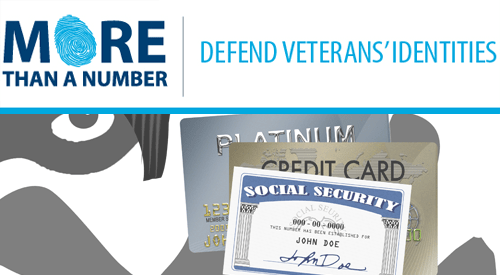Have you ever been a victim of identity theft or concerned about someone stealing your personal information? Or did you recently request a copy of your credit report only to discover that new lines of credit were opened in your name without your permission? You should have every reason to be concerned. According to the Federal Bureau of Investigation, identity theft is the nation’s fastest growing crime.[1] The Fair and Accurate Credit Transaction Act of 2003 defines identity theft as “fraud committed using the identifying information of another person.” Identity theft and fraud involving stolen identities is the fastest-growing category of complaints filed by consumers with the Federal Trade Commission (FTC).
Identity thieves have developed innovative techniques to gain access to your personal information, including that of many Veterans. Some common ways to commit identity theft or fraud are:
- Shoulder Surfing: stealing your information in public places while you make a purchase and provide your credit card over the phone or share your information with a sales associate in a store;
- Business Record Theft: stealing information from businesses where your personal information is stored (i.e., an employer, a medical provider’s office, etc.);
- Dumpster Diving: rummaging through trash or landfills to locate confidential information or discarded bank statements;
- Skimming: electronically recording credit card account numbers or account information as your credit card is processed, during or immediately following a transaction that you authorized; and
- Phishing: posting websites that pose as legitimate businesses or official entities, promising recipients benefits while requiring – then stealing – their identifying data.
The U.S. Department of Justice recommends four steps, using the acronym “SCAM,” to avoid becoming a potential victim.[2]
- Remain Stingy about providing personal information to others, providing it only to people who have a need to know.
- Immediately Contact financial institutions or credit card companies to report any unauthorized withdrawals or charges.
- Periodically Ask for a copy of your credit report.
- Maintain careful records of your banking and financial accounts.
A credit freeze, also referred to as a security freeze, is an effective tool against identity theft. This action allows you to seal your credit reports and use a personal identification number that only you know and can use to temporarily “thaw” your credit so legitimate applications for credit and services can be processed. Credit freezes can safeguard your data and prevent third-parties and identity thieves from establishing new credit in your name even if they obtain your identifying information. Freezing your credit files has no impact on any existing lines of credit.
These credit freezes have been available to victims of ID theft for years, but recently all three major credit bureaus[3] have allowed non-victims to establish credit freezes as well for a small fee.
To implement a credit freeze, you will need to contact each of the three major credit reporting agencies; Experian, TransUnion and Equifax.[4] You can initiate the process with the credit bureaus online, by phone or by e-mail. The crediting reporting agencies will request the following information to implement the security breeze on your behalf:
- Name
- Address
- Date of birth
- Social Security Number
The credit bureaus may request that you provide supporting documentation if you are a victim of identity theft or have been impacted by a national breach. Once your application is reviewed, the credit bureau(s) will issue a confirmation letter regarding your request to freeze your credit file. The letter will provide specifics around the freeze and a PIN or passcode. The turnaround time to process the request will vary for each credit reporting agency. The security freeze will remain on your credit file until you remove or temporarily lift the freeze, for example, if you need to apply for a loan or additional lines of credit.
States laws around security freezes vary but most states permit victims of identity theft to add a credit freeze at no charge.[5] Fees may apply for individuals who have not been subjected to identity theft at the time that they request the credit freeze.
If you are a Veteran and believe your identity or information has been compromised, please contact the VA Identity Safety Service at vaidtheft@va.gov or call the VA Identity Theft Help Line at 1-855-578-5492.
The FTC’s Privacy and Identity page provides extensive information, tools and best practices regarding identity theft and credit freezes.
ConsumerUnion released a credit freeze guide on February 5, 2014. This guide contains state-by-state credit freeze laws and security freeze instructions for the national credit bureau agencies.
You can also contact your State’s Attorney General to gather information about your state’s identity theft and credit freeze laws and provisions.
This article was provided by VA’s Identity Safety Service. VA’s “More Than a Number” identity protection program provides information to educate Veterans and their beneficiaries on how to protect themselves from identity theft, as well as how to combat identity theft tactics such as phishing. For more information please visit the More Than a Number website at www.va.gov/identitytheft . You will find there a wide range of information on identity theft, how to spot it, ways to prevent it and what to do if you suspect you have been made a victim. You can also browse through links to other useful identity theft resources from across the Web.
References:
[1] Fraud Prevention Blog, Identity Theft: The Fastest Growing Crime in America. Published on August 14, 2013 (http://blog.fraudfighter.com/bid/94512/Aug-14-2013-Identity-Theft-The-Fastest-Growing-Crime-in-America).
[2] The United States Department of Justice website: Identity Theft. Updated: November 2, 2015.
[3] Three Credit Bureaus – Equifax, Experian, TransUnion
[4] The Military Wallet, How to Place a Security Freeze on Your Credit File, published: February 16, 2012; last updated: September 29, 2014 (http://themilitarywallet.com/place-security-freeze-on-credit-file/).
[5] TransUnion, Control third party access to your credit with a security freeze (http://www.transunion.com/credit-freeze/place-credit-freeze).
Topics in this story
More Stories
According to the Internal Revenue Service (IRS), taxpayers lose millions of dollars each year due to tax-related scams and schemes, making it crucial for everyone, especially Veterans, to stay vigilant and informed to avoid falling victim to these fraudulent activities.
In observance of Identity Theft Awareness Week, Jan. 29 – Feb. 2, 2024, VA provides you and your loved ones information on how to safeguard your identity, keeping your VA benefits safe.
Learn how you can guard your VA online health information against scammers and online threats when using My HealtheVet or VA apps.







Those 3 credit agencys have never all replied when I requested to see my own credit files on a yearly basis.
I don’t doubt if they can earn $money$ doing a credit freeze you will get a response. Money talks.